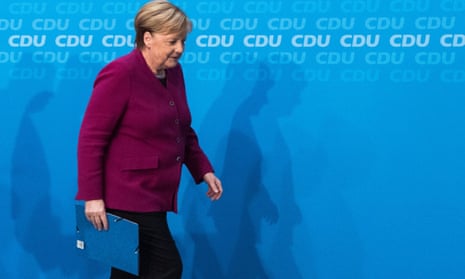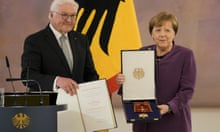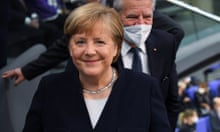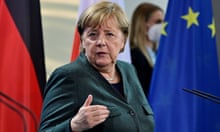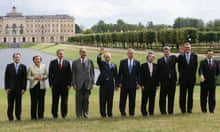After dominating European politics for well over a decade, Angela Merkel has said her fourth term as Germany’s chancellor will be her last.
Speaking after disastrous regional elections in Hesse and Bavaria for her Christian Democrats and its Bavaria-only sister party, Merkel on Monday said she saw the results as a “clear signal that things can’t go on as they are”.
She said she would not be standing as party leader at the CDU conference in December nor seek another term as chancellor at Germany’s next federal elections, due in 2021, adding that she would withdraw completely from politics after that date.
She also stated she would also not run for chancellor if snap elections were called before 2021.
Often hailed as the world’s most powerful woman and the de facto leader of Europe, Merkel long enjoyed German voters’ support as a guarantor of the country’s stability and prosperity.
But her authority has been severely weakened since her decision to keep Germany’s borders open at the height of Europe’s migrant crisis in 2015. The subsequent arrival of more than one million asylum seekers left the country deeply polarised and fuelled the rise of the far-right.
Merkel said she hoped her planned departure would end bitter fighting in her weak and fractious right-left coalition and allow it to focus on governing, declaring that “the picture the government is sending out is unacceptable”.
Voter dissatisfaction with the federal government had had a regrettable negative influence on the results in Hesse, she said.
Seeking to draw a line under a series of political crises that have rocked her fragile coalition, she added that her 13 years as chancellor had been a “daily challenge and an honour”, but that she recognised it was time to “start a new chapter”.
It had been widely assumed after her party’s disappointing showing in last year’s federal elections that this, Merkel’s fourth term as chancellor, would be her last, but she had not previously commented on her future.
She said on Monday she has made the decision before the summer parliamentary recess and had planned to announce it next week.
Her decision not to seek re-election as chair of her centre-right party kickstarts what looks set to be a close-fought race to replace her as its candidate for chancellor in 2021. Merkel, 64, has been CDU chair since 2000 and chancellor since 2005.
Her presumed favoured successor is the party’s secretary general, Annegret Kramp-Karrenbauer, who announced her candidacy on Monday, but Merkel declined to back her, saying she did not want to influence the election.
Friedrich Merz, a former parliamentary leader of the CDU/CSU alliance, has also joined the race to succeed his old party rival. Other favourites are the health minister Jens Spahn and the state premier of North Rhine-Westphalia, Armin Laschet.
Quick GuideMerkel's potential successors
Show
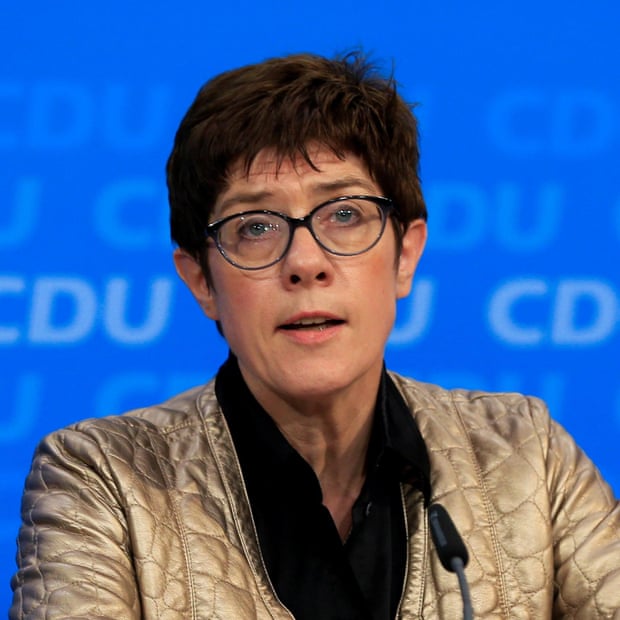
Annegret Kramp-Karrenbauer
The CDU general secretary is a staunch centrist, Merkel loyalist and the favourite to succeed her. The 56-year-old former premier of Saarland, who also goes by her initials AKK, is also thought to be Merkel’s preference to continue her work of modernising the party. Kramp-Karrenbauer is considered a pragmatist and was a quiet supporter of Merkel’s migration policy, but has expressed reservations about marriage and adoption rights for same sex couples. Her intention to stand as CDU leader was reportedly met with applause from party colleagues.
Jens Spahn
At 38, the German health minister is the youngest contender to succeed Merkel. Openly gay, he is firmly to the right of Merkel and has described himself as a “burqaphobe.” He has also warned against “putting the boot into Britain” over Brexit. Perhaps the harshest critic of Merkel’s migration policy within the CDU, Spahn has made a name for himself with his combative style but, it seems, it might not have made him many friends. In contrast to Kramp-Karrenbauer, his intention to stand was reportedly met with deathly silence from party colleagues.
Friedrich Merz
Merkel's old party rival was the first to announce he would stand to replace her. Back in Back in 2002, the dual party leaders (Merz was head of the CDU/CSU parliamentary bloc) had clashed over the latter's suggested slimming down of the tax system and his calls for a “German dominant culture.” Merkel pushed him out of office and out of politics altogether until recent rumours of a comeback for the 62-year-old.
Armin Laschet
The 57-year-old state premier of North Rhine-Westphalia and devout Catholic sits to the right of Merkel on migration, religion and family issues. In the past he has waded into debates about the role of Islam in Germany and has been a staunch opponent of same sex marriage as well as Germany’s military foreign interventions. He is thought to be close to the liberal FDP on energy policy.
Traditionally, the person who holds the position of party chair of the government’s largest party also occupies the role of chancellor, but this is not a binding rule. Merkel has previously said the two jobs belong together.
Merkel’s predecessor, the Social Democrat Gerhard Schröder, made the same move in 2004, giving up the position of party chair but remaining chancellor until November 2005. At the time, Merkel, who was then leader of the opposition, spoke of a “loss of authority all along the line”, and “the beginning of the end” of Schröder.
Christian Lindner, the leader of the liberal FDP party, was the first to demand Merkel’s resignation as chancellor on the back of her decision, calling for her ruling conservative bloc to “be prepared for a real new beginning in Germany”.
Merkel’s CDU allies, however, seem ready to accept her decision to stay on as chancellor for now. The former president of the German parliament Norbert Lammert told Die Welt it was acceptable as part of a “transition phase”, while the head of the CDU in the German state of Thuringia, Mike Mohring, spoke of a “turning point”. Others greeted the chance for renewal in the party.
David McAllister, a senior CDU MEP and close Merkel ally, said the chancellor’s announcement had come as a surprise to everyone.
“What she did today is give our party a chance for a fresh start,” he told the Guardian. He said he would welcome the continuation of the grand coalition, but urged all parties to put aside their differences.
“It is important that we now learn from the mistakes of the last months, all three coalition partners should stop fighting in public and concentrate on the issues. That is what Germans expect from their governments.”
The developments on Monday came after the CDU haemorrhaged support in two state elections in the past fortnight. In the the western state of Hesse, preliminary final results showed the party slumping to 27%, its worst showing in the state since 1966 and a drop of 11 points since Hesse last went to the polls in 2013.
Merkel’s coalition partner in Berlin, the Social Democrats (SPD), tanked to 19.8% in a dead heat with the resurgent Green party for second place. The result, the SPD’s worst since 1946, also piled pressure on the party leader, Andrea Nahles.
After news of Merkel’s decision not to stand for re-election as leader of the CDU, however, Nahles ruled out a change in leadership in her party. “A personnel configuration is not being discussed in the SPD,” she told journalists on Monday morning.
Sunday’s electoral trouncing for the ruling coalition came shortly after an equally disastrous result in Bavaria, widely seen as a protest against the failings of the Berlin government. Both results reflected the increasing fragmentation of Europe’s political landscape and the shrinking of the mainstream across the continent.
The euro fell briefly following Merkel’s announcement, reflecting anxiety at the planned departure from Europe’s top table of the cautious and experienced German chancellor.
Additional reporting by Jennifer Rankin in Brussels
